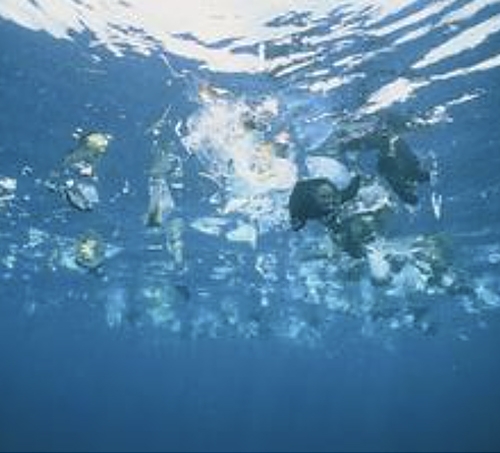SCIENTISTS HAVE CREATED an enzyme capable of digesting some of the most common types of plastics that pollute the Earth.
The discovery happened accidentally when researchers from Britain’s University of Portsmouth and the U.S. Department of Energy’s National Renewable Energy Laboratory were examining an enzyme found in a recycling center several years ago in Japan, according to the Energy Department lab.
Researchers unintentionally manipulated the enzyme, making it more successful at breaking down polyethylene terephthalate (PET), the material from which millions of plastic bottles are constructed. PET is one of the most common pollutants in the environment. Patented as plastic in the 1940s, the material is not biodegradable.
In a press release, the University of Portsmouth said that the discovery could result in an efficient recycling solution for the millions of plastic bottles that still persist in the environment. There are currently millions of tons of plastic bottles that will last for hundreds of years without breaking down.
During their research, senior scientist Bryon Donohoe and researcher Nic Rorrer tested how the enzyme, called PETase, broke down PET in plastic soda bottles.
“After just 96 hours, you can see clearly via electron microscopy that the PETase is degrading PET,” said Donohoe in NREL’s release. “And this test is using real examples of what is found in the oceans and landfills.”
The researchers are now working on improving the enzyme to be able to break down plastics at the industrial scale at a fraction of its current rate. John McGeehan, a scientist involved in the discovery and the director of the Institute of Biological and Biomedical Sciences at the university, gave his findings. McGeehan said when PET was patented there was no way to predict how much plastic pollution would be present today.
“Few could have predicted that since plastics became popular in the 1960s huge plastic waste patches would be found floating in oceans, or washed up on once pristine beaches all over the world,” McGeehan said in the university’s release. “We can all play a significant part in dealing with the plastic problem, but the scientific community who ultimately created these ‘wonder-materials,’ must now use all the technology at their disposal to develop real solutions.”
Plastics Made from Plants Could Solve the World’s Waste Problem
An estimated 8 million metric tons of plastic waste, including PET bottles, enter the ocean each year. By 2050, there will be as much plastic in the ocean by mass as there is fish. This creates huge man-made islands of plastic in parts of oceans all over the world.
Researchers also discovered that PETase can degrade polyethylene furandicarboxylate (PEF), which is commonly used as a substitute for PET and is hailed as a replacement for glass bottles.
“Serendipity often plays a significant role in fundamental scientific research and our discovery here is no exception,” McGeehan said. “Although the improvement is modest, this unanticipated discovery suggests that there is room to further improve these enzymes, moving us closer to a recycling solution for the ever-growing mountain of discarded plastics.”
